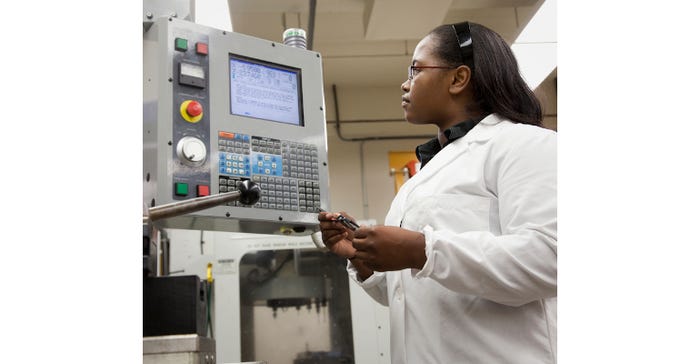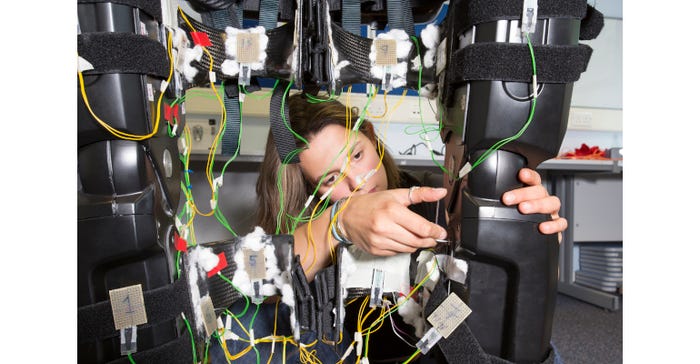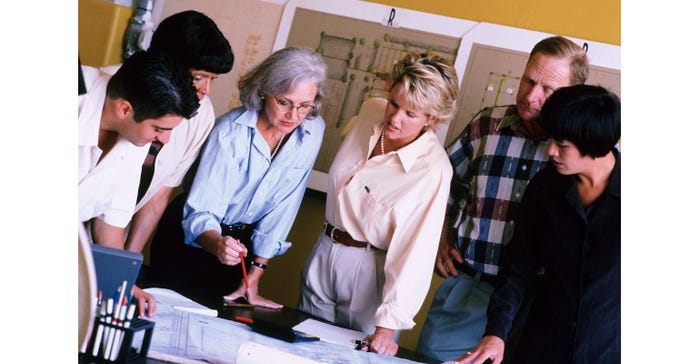Supporting Women’s Career Advancement in Manufacturing: Strategies and Best Practices
Promoting gender diversity in manufacturing roles supports women’s career development and may contribute to the overall competitiveness of an organization.
![manufacturing-Sandvik-Coromant_DEI-Magalie-Jackson_IMAGE1[31].jpg manufacturing-Sandvik-Coromant_DEI-Magalie-Jackson_IMAGE1[31].jpg](https://eu-images.contentstack.com/v3/assets/blt14ac89070d5e4751/blte580818608db285b/65673ffac0467c040a597545/manufacturing-Sandvik-Coromant_DEI-Magalie-Jackson_IMAGE131.jpg?width=850&auto=webp&quality=95&format=jpg&disable=upscale)
By utilizing technological advancements and optimizing processes to improve global competitiveness, the manufacturing industry has made great strides in recent years. However, despite these strides, a sizable gender gap remains in the sector, with women significantly underrepresented in executive leadership roles. There is an immense potential and untapped talent that women bring to the sector. Addressing this imbalance and working toward fostering a more-inclusive and diverse workforce is crucial. This article sheds light on the importance of promoting gender diversity and women’s representation in executive roles, while also highlighting effective strategies and best practices to support women’s career advancement in the manufacturing industry.
Understanding the Challenges Women Face in Manufacturing
Data shows that there is a lack of women in manufacturing leadership positions, and this trend becomes more pronounced the higher up the corporate ladder one looks. Roles that require strategic decision-making, like executive management, research and development, and technical leadership, are especially influenced by this gender disparity. Identifying common barriers and biases that hinder women’s career growth in manufacturing is essential. These challenges include persistent gender bias within organizational structures and stereotypes and assumptions about gender roles that lead to the undervaluation of women’s contributions and capabilities. Additionally, traditional work cultures may be less accommodating of work-life balance needs, predominately affecting women who often handle caregiving responsibilities. Empowering women to progress their careers within the manufacturing industry requires addressing these challenges and fostering a more-inclusive workplace culture.
Creating a Gender-Inclusive Workplace Culture
Fostering a more-inclusive workplace culture begins with creating a sense of belonging and raising employee and leadership awareness. Workshops and training sessions on unconscious bias assist individuals in identifying and confronting their existing biases, thus guaranteeing just and unprejudiced treatment of all employees. These awareness initiatives should cover topics such as microaggressions, gender stereotypes, and the importance of diversity in driving innovation and success. By promoting communication and empathy, employees and leaders can work together to build a workplace where everyone feels valued and respected.
Encouraging open discussions on diversity and inclusion is equally important in creating a gender-inclusive workplace. Manufacturing companies can hold townhall meetings, focus groups, and diversity forums to give employees a chance to share their experiences and views. By establishing a safe space for these conversations, employees can express their concerns and suggestions. This allows for the pinpointing of specific challenges faced by women in the industry. Moreover, these discussions generate valuable insights on how to enhance policies, practices, and resources that support women’s career advancement. Listening to employees’ voices and involving them in decision-making processes can help create a culture that is more responsive to the needs of all employees.
Establishing mentorship and sponsorship programs is crucial in supporting women’s development in the manufacturing industry. Pairing aspiring female professionals with experienced mentors allows them to gain valuable guidance, encouragement, and insights into navigating the corporate landscape. Mentors can help women build confidence, expand their networks, and identify growth opportunities within the organization. Aside from mentorship, sponsorship programs are equally essential. Sponsors advocate for their proteges’ advancement, actively promoting them for new roles, assignments, or leadership opportunities. By formalizing mentorship and sponsorship initiatives, manufacturing companies demonstrate their commitment to supporting women’s career growth, empowering them to reach their full potential and contribute significantly to the organization’s success.

Implementing Gender-Neutral Hiring and Promotion Practices
To create a gender-inclusive workforce, manufacturing companies should implement gender-neutral hiring and promotion practices. Gender-based language in job descriptions can unintentionally discourage certain genders from applying. By identifying and removing such language, companies create an inclusive and welcoming environment for all candidates. Ensuring diverse interview panels for recruitment is instrumental in mitigating biases and ensuring fair hiring practices. Forming panels that include individuals from different backgrounds and genders provides varied perspectives on candidates and their qualifications, minimizing unconscious biases during the interview process. Furthermore, diverse interview panels signal the company’s commitment to fostering an inclusive work environment, inspiring potential employees to envision a workplace where their contributions will be recognized and valued.
Promotions should be based solely on merit and potential, regardless of gender. Evaluating and eliminating unconscious biases during promotion decisions is essential for promoting fairness and gender diversity in leadership positions. Companies should provide training and sensitize leaders and managers about unconscious biases, enabling them to recognize and challenge their preconceived notions. Implementing clear and transparent promotion criteria further enhances fairness in decision-making processes. Regularly reviewing promotion outcomes and tracking demographic data allow organizations to identify and address any disparities, fostering a more equitable path to leadership positions for both men and women in the manufacturing industry.
Providing Training and Skill Development Opportunities
Identifying skill gaps and areas for improvement is crucial for supporting women’s career advancement in manufacturing. Conducting comprehensive skills assessments and performance evaluations can pinpoint specific areas where training and development are needed. By assessing the skillsets of male and female employees, we can ensure that training opportunities are equitably accessible to everyone, thereby creating a level playing field for professional development. Addressing skill gaps enhances individual performance and contributes to the overall productivity and competitiveness of the organization.
Offering targeted training programs is critical for empowering women to thrive in leadership roles within the manufacturing sector. Leadership development initiatives equip aspiring female leaders with the necessary tools to communicate effectively, build strong teams, and make informed decisions. Simultaneously, technical training programs provide women with the expertise required to excel in their specialized fields. By offering a broad spectrum of training opportunities, we can ensure that women have the resources they need to attain leadership positions and excel in various areas of manufacturing.
Continuous learning is essential for personal and organizational growth in an ever-evolving industry. Companies can encourage a culture of continuous learning by providing various opportunities such as workshops, seminars, webinars, and conferences. These events allow employees to expand their knowledge, stay updated on industry trends, and encourage networking and collaboration with peers. Additionally, companies can provide women with continuous support and advice through mentorship and coaching programs. A supportive environment that encourages continuous learning and professional growth helps women in manufacturing grow their skills and advance to leadership positions.
Work-Life Balance and Flexible Work Arrangements
Recognizing the importance of work-life balance for women in manufacturing is crucial for their career advancement. Women typically play multifaceted roles that often extend beyond the workplace. Balancing career aspirations with family responsibilities and personal commitments can be particularly challenging for women in manufacturing. Acknowledging the significance of work-life balance not only promotes employee well-being but also improves job satisfaction, productivity, and retention. By understanding and valuing the diverse needs of their female workforce, companies can foster an inclusive environment that encourages women to excel professionally without compromising their personal lives.
To empower women in manufacturing, companies need to implement flexible work arrangements that accommodate family responsibilities. Offering options such as telecommuting, flexible hours, and compressed workweeks enables women to better balance their work and personal life. Flexible work arrangements not only enhance work-life balance but also promote employee loyalty and commitment. By providing these options, manufacturing companies demonstrate their commitment to fostering an inclusive and supportive work environment that values the contributions of women and respects their individual life circumstances.
While implementing work-life balance initiatives is essential, companies must also avoid any stigma associated with them. Some workplaces may perceive employees who partake in flexible work arrangements as less committed or dedicated to their jobs. To counteract this misconception, organizational leaders and managers should set an example of work-life balance by embracing it themselves. Emphasizing the importance of flexible work arrangements and showcasing stories of success can help dispel any stigma and create a culture in which all employees feel comfortable taking advantage of such opportunities. Ultimately, breaking down the stigma associated with work-life balance initiatives creates a more-inclusive and supportive workplace culture that enables women to reach their full potential in the manufacturing industry.

Fostering Women’s Networking and Support Systems
Creating a supportive network for women in manufacturing is essential for their career advancement. Employee resources groups (ERGs) specifically designed for women provide a safe and supportive space for them to connect, collaborate, and share experiences. ERGs offer opportunities for networking, mentorship, and professional development specifically for women in the field. By establishing these platforms, manufacturing companies empower women to build meaningful relationships, gain valuable insights, and access resources that can accelerate their career growth. ERGs also play a crucial role in fostering a sense of belonging and inclusivity, enabling women to thrive in their roles and pursue leadership opportunities with confidence.
Another effective way to foster women’s networking and support systems in manufacturing is by encouraging their active participation in industry events and conferences. These gatherings help women to expand their networks, showcase their expertise, and stay abreast of industry trends. By sponsoring or supporting women’s attendance at these events, companies demonstrate their commitment to promoting gender diversity and investing in the professional growth of their female workforce. Encouraging women’s representation in these spaces not only enhances their visibility but also helps break down barriers and stereotypes, inspiring the next generation of female talent to pursue careers in manufacturing.
Additionally, manufacturing companies can create a structured support network for women to share their experiences and challenges. This network can take the form of mentorship circles, peer support groups, or regular discussion forums. By providing a platform for women to openly discuss their professional journeys, triumphs, and obstacles, companies enable them to learn from each other’s experiences and offer valuable advice and encouragement. This support network creates a sense of camaraderie and mutual empowerment, boosting the confidence and resilience of women in the manufacturing industry. This network can help identify and address gender-specific issues for the organization and provide valuable feedback for improvement.
Recognizing and Celebrating Women’s Achievements
To further support women’s career advancement in manufacturing, companies must proactively acknowledge and reward their contributions to the company’s success. Regularly recognizing achievements through internal communication channels, such as companywide emails or recognition ceremonies, boosts morale and motivates women to continue striving for excellence. Offering rewards and opportunities for career advancement based on merit ensures that women are celebrated for their achievements and provided with the means to progress in their careers.
Highlighting successful women leaders within the manufacturing company as role models can have a profound impact on inspiring the aspirations of others. By sharing the stories and accomplishments of these women through newsletters, company websites, or internal mentoring programs, organizations demonstrate the possibilities and potential for growth within their ranks. When women see female leaders succeeding, it boosts confidence and ambition, leading to increased participation in pursuing career advancement. Showcasing these role models also reinforces the organization’s commitment to diversity and provides a tangible testament to the opportunities available for women to thrive in the manufacturing industry.

Transparency and Accountability in Gender Diversity Efforts
Establishing clear and measurable diversity and inclusion goals is vital for supporting women’s career advancement in manufacturing. Companies can make progress toward gender equality by setting specific objectives related to increasing representation of women in leadership positions, promoting gender balance across all levels of the organization, and fostering an inclusive culture. These goals should be specific, attainable, and time-bound, allowing for objective assessment of the organization’s commitment to gender diversity. Regularly measuring and reporting on progress toward these goals not only holds the organization accountable but also provides valuable insights into areas that require further attention and improvement.
Measuring progress goes hand in hand with regularly evaluating the effectiveness of the strategies and initiatives implemented to support women’s career advancement. Continuous evaluation allows organizations to determine which efforts have been successful and identify those that may require adjustments or enhancements. Surveys, employee feedback, and key performance indicators can provide data for evaluating the impact of programs and initiatives. Organizations must engage with their female workforce, seek their input, and take their feedback into account during evaluation. Companies can identify best practices and areas where further investments are needed through comprehensive analysis of outcomes.
To foster meaningful and sustainable change, manufacturing companies must be committed to making necessary adjustments based on the evaluation of progress. The insights gained from measuring and evaluating initiatives should inform the organization’s strategies for continuous improvement. Whether it involves refining existing programs, introducing new initiatives, or addressing any unintended consequences, organizations must be proactive in responding to the data. Embracing a culture of continuous improvement demonstrates a willingness to adapt and evolve in the pursuit of gender equality and women’s career advancement. Moreover, it reinforces the organization’s dedication to fostering an environment where women can succeed in the manufacturing industry.
Supporting women’s career advancement in the manufacturing industry is not only a matter of fairness but also one of strategic significance. Embracing gender diversity and inclusion are key to driving innovation, creativity, and business success. The manufacturing industry can improve competitiveness and growth by harnessing the diverse perspectives of women. Companies can take concrete steps toward a culture of inclusion, equality, and empowerment by implementing gender-neutral hiring and promotion practices, creating a supportive network for women, providing training and skill development opportunities, and recognizing and celebrating women’s achievements.
Advocating for and collaborating with educational institutions and industry associations is instrumental in promoting gender diversity and supporting women’s career advancement in manufacturing. By partnering with universities and colleges, companies can attract and retain female talent by participating in career fairs, workshops, and events tailored to female students. Partnering with industry associations allows companies to access valuable resources, best practices, and insights to facilitate the professional growth of their female workforce. Supporting initiatives that encourage girls to pursue STEM education is important for a more-diverse and inclusive manufacturing workforce in the future.
Measuring progress and regularly evaluating the effectiveness of strategies and initiatives are vital for driving meaningful change. Setting clear and measurable diversity and inclusion goals helps chart a path toward gender equality and provides valuable insights into areas that require improvement. Transparency and accountability in gender diversity efforts reinforce the organization’s commitment to promoting women’s career advancement in manufacturing.
By embracing these strategies and best practices, manufacturing companies can create a workplace that embraces gender diversity, fosters talent, and cultivates a diverse pool of leaders. Supporting women’s career advancement not only benefits individual women professionals but also strengthens the manufacturing sector by harnessing the full potential of its diverse talent pool. Together, we can build a more-inclusive, innovative, and successful manufacturing industry through concerted efforts and collaboration.

About the Author(s)
You May Also Like



.png?width=300&auto=webp&quality=80&disable=upscale)
